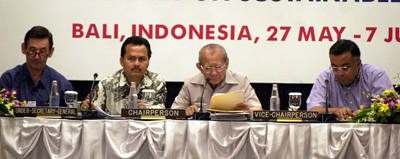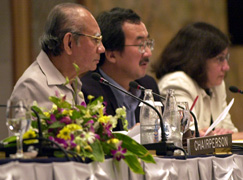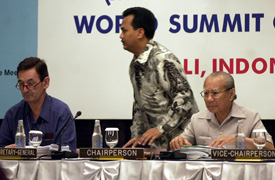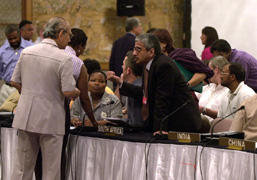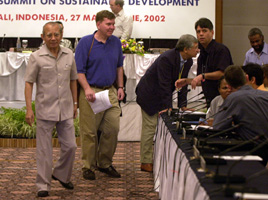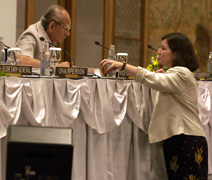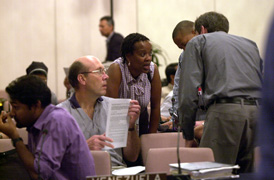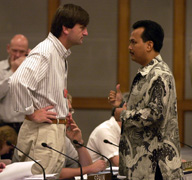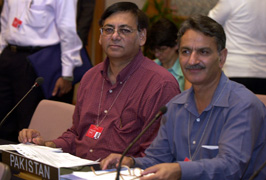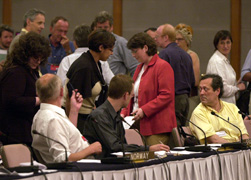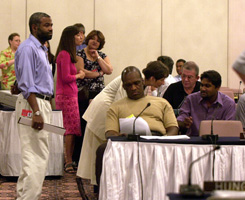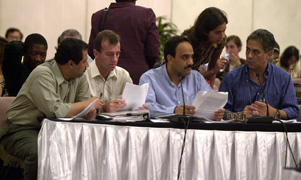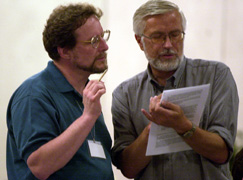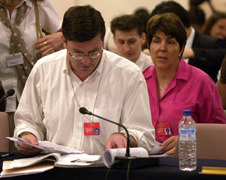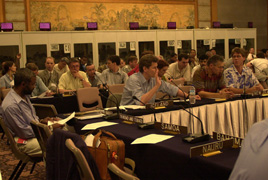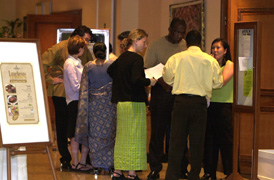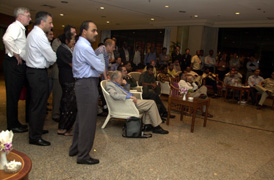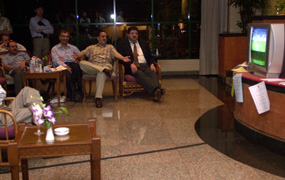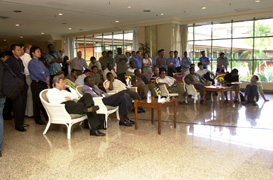 |
|
|
|
|||||||
|
The
World Summit on Sustainable Development
Fourth Preparatory Committee (WSSD PrepCom IV) Bali, Indonesia | 25 May - 7 June 2002 Saturday, 1 June
Delegates met in an informal Plenary session throughout the day and evening to resolve outstanding issues on the updated Revised Chairman's Paper, while the Working Group on sustainable development governance met in morning, afternoon and late into the evening. The Working Group on Governance also convened, as did several contact groups. The contact groups on finance and Africa met, and contact groups on energy, biodiversity and oceans reconstituted by the Informal Plenary to resolve the still outstanding issues. The Informal Plenary also established a new contact group on means of implementation to address issues other than on finance and trade. Above photo (L-R): Lowell Flanders, UN DESA, Indonesia, Chair Emil Salim, and Chair Ihab Gamaleldin, Egypt |
| Informal Plenary | |
|
Chair
Salim presided over the Informal Plenary
|
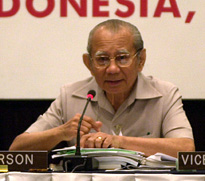 |
| Jos Delbeke, the European Commission (center) | |
|
|
|
|
Chair Salim with the US and Luis Niño, Venezuela Regarding language on continuing to implement the work programme on education for sustainable development agreed to by the CSD. The US asked for more information on the work programme. The EU noted that UNESCO had reported on the success of the programme, but the US preferred to keep the reference bracketed. |
|
|
Chair Salim with Working Group I Chair Maria Viotti, Brazil, before the convening of the morning Plenary. |
|
|
Japan (right) expressed his dissatisfaction over the procedure that took place regarding the text on health care the previous night, noting that it was read out very fast and then adopted. He asked that this be put on the official record. |
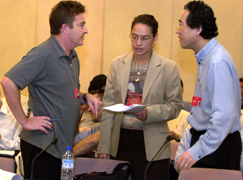 |
|
G-77/China consulting The G-77China proposed language on assisting developing countries through international cooperation to enhance their capacities in issues relating to environmental protection. The EU and the US supported this proposal. |
|
|
Switzerland
and Hungary
|
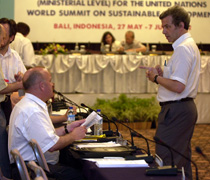 |
|
The EU with Indonesia Regarding means of implementation and the transfer of technology, delegates debated whether to include language on establishing a new mechanism for the transfer of environmentally sound technologies or whether to use existing mechanisms. The G-77/China supported language on establishing a new mechanism. The EU asked who would establish this new mechanism. |
|
|
The G-77/China Regarding establishment of technology clearinghouses, delegates agreed to a G-77/China proposed compromise to "enhance existing national institutional capacity in developing countries to improve access to, development, transfer and diffusion of environmentally sound technologies (ESTs) and corresponding know-how." |
|
|
Delegates
from Pakistan
|
|
|
Sharifah
Zaharah, Malaysia, Mustafa Tolba, Former Executive Director of UNEP
|
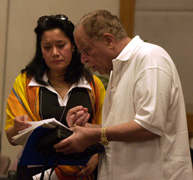 |
|
|
|
|
Delegates
taking notes during the informal Plenary
|
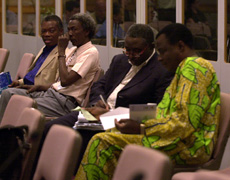 |
|
|
G-77/China on a break during the informal Plenary |
|
The
G-77/China consults on energy; Chair Salim re-established a contact group
to resolve all the outstanding issues on energy, which was chaired
by Maria Viotti, Brazil
|
|
|
Peter Schei, Norway (right) and John Matuszak (US) consult on the Africa text |
|
|
David van Hoogstraten preparing to make an intervention (left) (US) |
|
|
|
|
|
On
providing assistance to developing countries to access publicly owned
ESTs, Australia proposed an alternative from CSD-6, to
"promote the transfer to developing countries of non-patented or
non-commercialized technologies resulting from publicly funded
research activities, including through technology cooperation." |
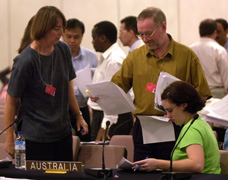
|
|
Iceland signalling to make an intervention |
|
|
Delegates from the EU and Africa discuss the section on Africa |
|
|
Working Group III: Governance |
|
|
Delegates
discussed, inter alia, limiting negotiations in the CSD,
and also focusing on actions and exchange of experiences. The US and
Japan preferred that the CSD should negotiate decisions every four
years, while the EU, Canada and the G-77/China supported negotiations
every two years.
|
 |
| Contact Group: Finance and Trade | |
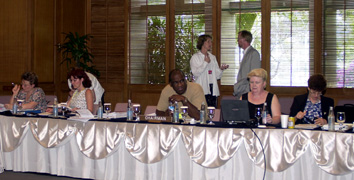
|
John Ashe (center), Antigua and Barbuda, chaired the contact group on finance |
|
Ghana
(second from right) coordinated finance for the G-77/China
|
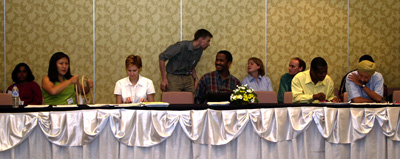 |
| John Ashe, Antigua and Barbuda, consulting on finance. | |
| Miscellaneous Photos: | |
|
Delegates watch the World Cup late on Friday evening and on Saturday |
|
|
Delegates look at their photos on the bulletin board |
|
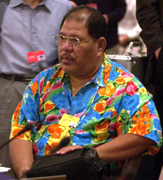 Delegates throughout the week have been keeping with the Chair's request to dress casually in Bali. |
|
|
Back to Linkages home - Visit IISDnet
- Send e-mail to ENB
©
2002, IISD. All rights reserved.
